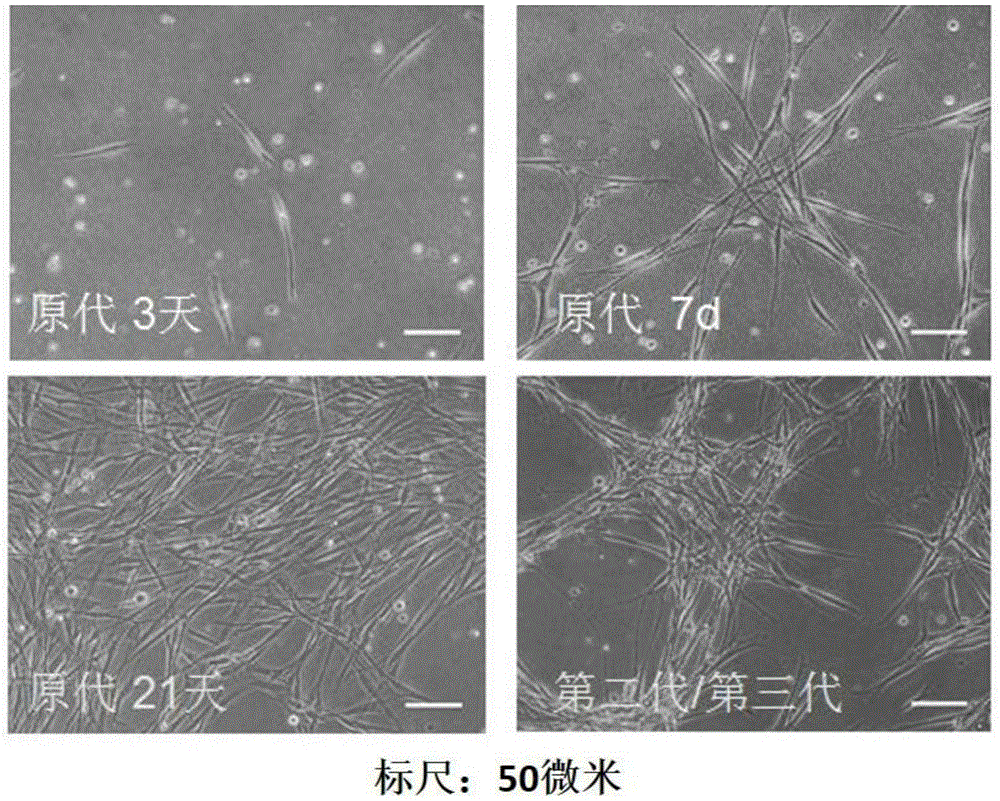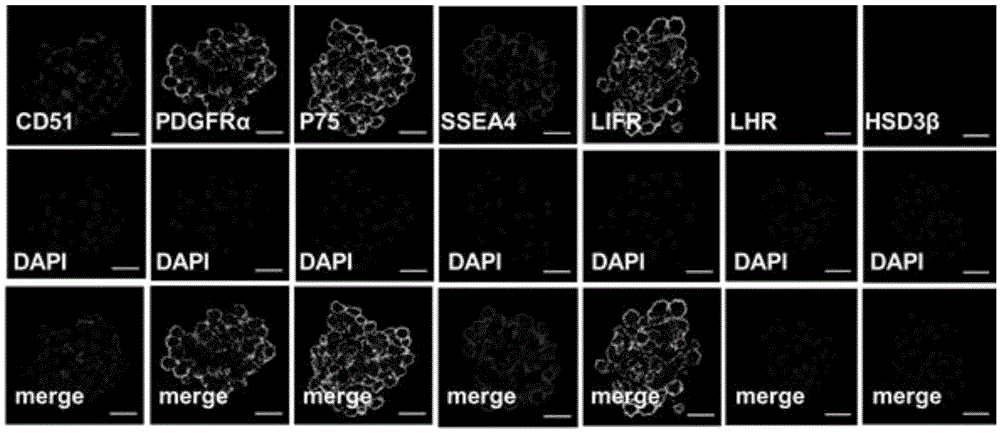Separation and culture method and application of human testis mesenchymal stem cells
A testicular interstitial, separation method technology, applied to animal cells, vertebrate cells, bone/connective tissue cells, etc., can solve the problems of no CD51, no related reports on separation and culture, long equilibration time, etc. Effects of Serum Testosterone Levels
- Summary
- Abstract
- Description
- Claims
- Application Information
AI Technical Summary
Problems solved by technology
Method used
Image
Examples
Embodiment 1
[0037] Example 1 Isolation of CD51 positive cells from testicular specimens of obstructive azoospermia patient tissue biopsy
[0038] For patients with obstructive azoospermia, after the testicular tissue biopsy was taken out, some specimens were placed in iced DMEM / F12 medium containing 15 μg / ml gentamicin, and stored at 0-4°C. Within 2 hours, process tissue samples: use micro scissors to cut the tissue until the length of each seminiferous tubule is about 1 mm, then put in 1 mg / ml type IV collagenase solution containing DNase enzyme (450 U), at 37 °C , 5%CO 2 Incubate under conditions for 30 min, add 3 times the volume of PBS to dilute collagenase, and centrifuge at 1500 rpm for 5 min; discard the supernatant, add 15 ml of PBS, and filter the cell suspension with a nylon mesh with a pore size of 40 μm, and centrifuge the collected filtrate at 1500 rpm for 5 min to obtain human testicular cells
[0039] CD51 antibody labeling was performed. Mix the fluorescently labeled CD...
Embodiment 2
[0040] Example 2 Identification of CD51-positive human testicular mesenchymal stem cells self-renewal and proliferation ability
[0041] a. Identification of self-renewal ability of CD51-positive human testicular mesenchymal stem cells:
[0042] 1) The CD51-positive hSLCs isolated in Example 1 were placed in each single well of a 6-well plate for culture. The composition of the culture solution is to add 1nM dexamethasone, 2ng / ml LIF, 50ng / ml insulin, 50ng / ml transferrin, 50pg / ml sodium selenite, 5% (V / V) chicken embryo in DMEM-F12 medium Extract, 1% (V / V) non-essential amino acids, 2% (V / V) B27 serum-free supplement, 20 ng / ml bFGF, 20 ng / ml EGF, 20 ng / ml PDGFBB. Observe the formation of cell clones. When the size of cell clones reaches more than 50 μm and the density reaches 70%, the cells are digested with 0.05% trypsin-EDTA at 37° C. for 30 seconds, and then passaged. figure 1 It shows that the sorted primary cells adhere to the wall in the culture medium, grow in a spind...
Embodiment 3
[0050] Example 3 Observation of the role of CD51-positive human testicular mesenchymal stem cells in tissue repair in vivo
[0051]The ability of stem cells to regenerate damaged tissues in the body is an important attribute. Previous studies have shown that treatment with thecytotoxinethanedimethylsulfonate (EDS) for 4 days may deplete Leydig cells. Therefore, a rat model of Leydig cell loss (EDS model) was established to investigate whether CD51-positive human Leydig stem cells could promote the recovery of Leydig cells in the EDS model. Two groups of adult rats were selected, namely the model group and the cell group. Rats in the model group (EDS(+) / saline(+)) were intraperitoneally injected with EDS, and 4 days later, 20 μl of normal saline was injected into the testis (10 μl / unilateral testis). After 4 days of intraperitoneal injection of EDS (75 mg / kg body weight) in the rats of the cell group (EDS(+) / Cell(+)), the CD51-positive human testicular mesenchymal stem cells ...
PUM
 Login to View More
Login to View More Abstract
Description
Claims
Application Information
 Login to View More
Login to View More - R&D
- Intellectual Property
- Life Sciences
- Materials
- Tech Scout
- Unparalleled Data Quality
- Higher Quality Content
- 60% Fewer Hallucinations
Browse by: Latest US Patents, China's latest patents, Technical Efficacy Thesaurus, Application Domain, Technology Topic, Popular Technical Reports.
© 2025 PatSnap. All rights reserved.Legal|Privacy policy|Modern Slavery Act Transparency Statement|Sitemap|About US| Contact US: help@patsnap.com



